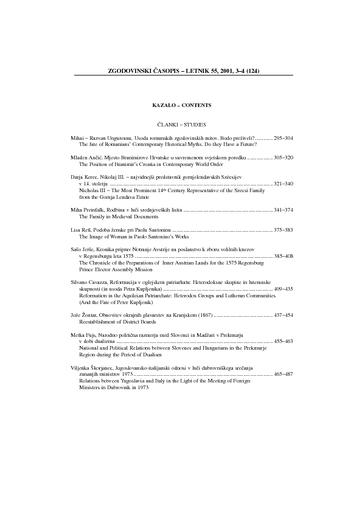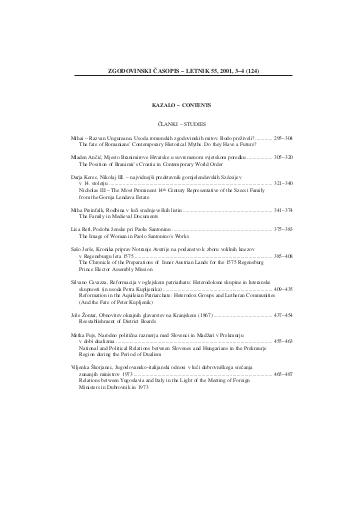/
Serijske publikacije
/
Zgodovinski časopis
Jugoslovansko-italijanski odnosi v luči dubrovniškega srečanja zunanjih ministrov 1973


To delo avtorja Viljenka Škorjanec je ponujeno pod Creative Commons Priznanje avtorstva-Nekomercialno-Deljenje pod enakimi pogoji 4.0 Mednarodna
Datoteke (1)

Opis
The paper focuses on the dual meaning of the meeting of Italian foreign minister Giuseppe Medici and Yugoslav foreign minister Miloš Minić, which took place in Dubrovnik in March 1973. In order to better understand the complex relations between the two countries at the time, the author discusses other turningpoints in the history of Italy and Yugoslavia after 1954. The Dubrovnik meeting denoted a considerable qualitative shift in international relations and the negotiation process on the way to the Ossimo Accord. After several years of procrastination and a deft use of its negotiating skills, the Italian side finally agreed to appoint two mandatories who would meet in Dubrovnik. In order to prepare a proposal of the final agreement, these mandatories replaced experts who had previously conducted the negotiations. Concrete time limits for the fulfillment of the obligations on the Italian side were formed simultaneously. Aside from the official, diplomatic channel, the ministers privately agreed to establish another, parallel chanel for secret negotiations of political mandatories as a possibility to continue negotiations should the – likewise secret – official negotiations fail to progress. The Italian political leadership, and especially the Christian Democratic Party, wished to use the second channel in order to establish a direct dialog alongside the official state relations that had been created by the diplomacy.
Metapodatki (12)
- identifikatorhttps://hdl.handle.net/11686/5398
- naslov
- Jugoslovansko-italijanski odnosi v luči dubrovniškega srečanja zunanjih ministrov 1973
- Relations between Yugoslavia and Italy in the Light of the 1973 Dubrovnik Meeting of Foreign Ministers
- ustvarjalec
- Viljenka Škorjanec
- soavtor
- Peter Štih (odg. ur.)
- predmet
- jugoslovansko-italijanski odnosi
- 1973
- zunanja politika
- meje
- politična srečanja
- jugoslovansko italijanska meja
- Dubrovnik
- Memorandum o soglasju
- Londonski memorandum
- zunanji ministri
- kronologija
- opis
- The paper focuses on the dual meaning of the meeting of Italian foreign minister Giuseppe Medici and Yugoslav foreign minister Miloš Minić, which took place in Dubrovnik in March 1973. In order to better understand the complex relations between the two countries at the time, the author discusses other turningpoints in the history of Italy and Yugoslavia after 1954. The Dubrovnik meeting denoted a considerable qualitative shift in international relations and the negotiation process on the way to the Ossimo Accord. After several years of procrastination and a deft use of its negotiating skills, the Italian side finally agreed to appoint two mandatories who would meet in Dubrovnik. In order to prepare a proposal of the final agreement, these mandatories replaced experts who had previously conducted the negotiations. Concrete time limits for the fulfillment of the obligations on the Italian side were formed simultaneously. Aside from the official, diplomatic channel, the ministers privately agreed to establish another, parallel chanel for secret negotiations of political mandatories as a possibility to continue negotiations should the – likewise secret – official negotiations fail to progress. The Italian political leadership, and especially the Christian Democratic Party, wished to use the second channel in order to establish a direct dialog alongside the official state relations that had been created by the diplomacy.
- založnik
- Zveza zgodovinskih društev Slovenije
- datum
- 2001
- tip
- besedilo
- jezik
- Slovenščina
- jeDelOd
- pravice
- licenca: ccByNcSa
